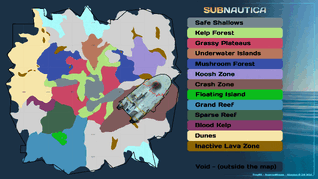Biomes (Subnautica): Difference between revisions
m (changed and ordered the Grand Reef's depth to what it says on the Grand Reef's article.) Tags: Visual edit apiedit |
m (Changed depth from Grassy Plateaus edit.) Tags: Visual edit apiedit |
||
| Line 8: | Line 8: | ||
* [[Safe Shallows]] (1m - 80m) |
* [[Safe Shallows]] (1m - 80m) |
||
* [[Kelp Forest]] (25m - 150m) |
* [[Kelp Forest]] (25m - 150m) |
||
* [[Grassy Plateau]]s ( |
* [[Grassy Plateau]]s (5m - 150m) |
||
* [[Mushroom Forest]] (125m - 200m) |
* [[Mushroom Forest]] (125m - 200m) |
||
* [[Sparse Reef]] (40m - 310m) |
* [[Sparse Reef]] (40m - 310m) |
||
Revision as of 17:04, 7 September 2015
Subnautica features a wide range of Biomes to explore and conquer. Biomes in Subnautica represent minature ecosystems. The word itself comes from the term Bioformation.
Developer footage of Biome generation can be seen on a playlist from Russel Maekim's Youtube channel. He also sometimes livestreams his work on Twitch.
Biomes
- Atmosphere Biome (Floater Islands)
- Safe Shallows (1m - 80m)
- Kelp Forest (25m - 150m)
- Grassy Plateaus (5m - 150m)
- Mushroom Forest (125m - 200m)
- Sparse Reef (40m - 310m)
- Dunes (160m - 400m)
- Grand Reef (40m - 450m)
- Koosh Zone (150m - 490m)
- Underwater Islands (35m - 500m)
- Mountains (0m - 500m)
Caves
- Deep Grand Reef
- Jelly Shroom Caves
- Kelp Forest Caves
- Lava Caves
- Mountain Range Caves
- Mushroom Forest Caves
- Overgrown Caves
- Safe Shallows Caves
- Spike Plant Caves







